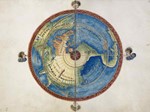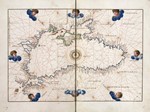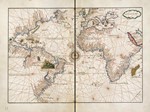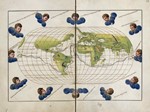Atlas Battista Agnese
Content: text (51 symbols)
Uploaded: 23.02.2020
Positive responses: 0
Negative responses: 0
Sold: 2
Refunds: 0
$0.99
Battista Agnese (circa 1500–1564), an Italian cartographer born in Genoa and working in Venice from 1536 to 1564, is one of the most significant figures in Renaissance cartography. He created about a hundred manuscript atlases, of which over 70, signed by him or attributed to his school, have survived to our time. His atlases, considered to be works of art due to the high quality and beauty of the image, are mainly portulans, or navigation atlases printed on parchment and intended for high-ranking officials and wealthy merchants. This atlas of 1544 contains 15 full-page colored prints with detailed maps and geographical data. The cards are made in bright colors and decorated with images of cherubs on the clouds. Some cards are decorated with gold. The oval "mappa mundi" is decorated with images of cherubs, or winds, in blue and gold clouds. They represent the classic wind rose of 12 rumba, which have changed into modern compass rumba. The most detailed maps show coastlines, ports and rivers. These maps were a navigation tool of the time, but usually they did not depict land elements, except for large and small cities. The atlas contains an image of the armillary sphere and a beautifully drawn table of zodiac signs.
No feedback yet



